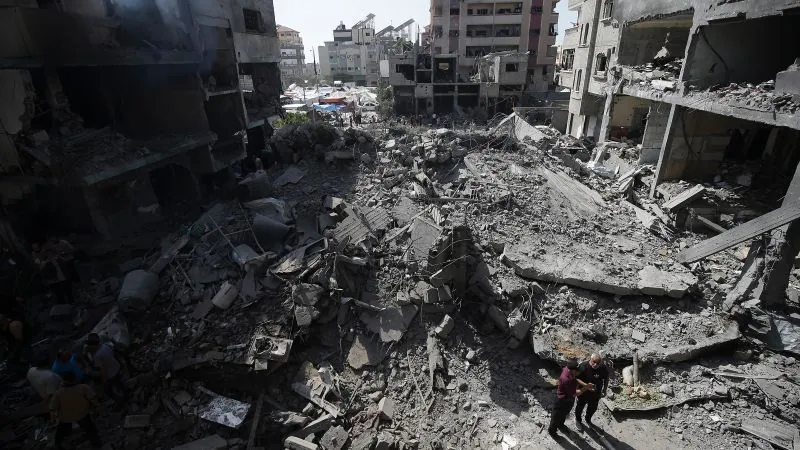
Hamas Signals Hope for Gaza Deal Despite Ongoing Challenges
2024-12-18
Author: Lok
Hamas Optimism on Ceasefire Negotiations
Hamas is expressing newfound optimism regarding negotiations surrounding a potential ceasefire and the release of hostages in Gaza, amidst a surge of diplomatic efforts in the region.
In a statement released recently, Hamas indicated that reaching an agreement is "possible," with sources from the group describing the discussions as "positive and optimistic." This sentiment echoes the views of key officials from the U.S., Israel, Qatar, and Egypt, who have noted progress in ongoing negotiations. However, it remains critical to highlight that no formal agreement has yet been attained.
CIA Director's Upcoming Visit to Qatar
CIA Director Bill Burns is scheduled to visit Qatar this week for further talks. Sources suggest that these discussions will take place in Doha, demonstrating the involvement of high-level U.S. officials in these crucial negotiations. An Israeli source warned that finalizing a deal could still take weeks.
Barriers Persist in Negotiations
Hamas has pointed out that barriers persist, with allegations that Israel is introducing new conditions into the talks. The group reiterated, "The Islamic Resistance Movement Hamas affirms that in light of the serious and positive discussions taking place in Doha today, reaching an agreement for a ceasefire and prisoner exchange is possible if the occupation stops imposing new conditions."
Indirect Negotiations in Qatar
Currently, both Hamas and Israeli teams are engaged in indirect negotiations in Qatar, with the Israeli delegation reportedly including members from the Mossad and Shin Bet security agencies. This marks the most intensive round of dialogue since negotiations stalled in late August.
Framework of the Proposed Agreement
The terms being discussed echo a framework similar to the one proposed by U.S. President Joe Biden earlier this year, which was structured in three phases. The initial phase seeks to facilitate the release of hostages currently held by Hamas while establishing a full ceasefire. This phase would see Israeli forces withdrawing from populated areas in Gaza and the release of key hostages, which would entail an exchange with hundreds of Palestinian prisoners.
Challenges to Ceasefire Agreement
However, there are significant challenges to overcome, particularly concerning the Israeli military's potential continued presence in certain areas of Gaza, specifically the Philadelphi corridor and the Netzarim corridor. This insistence on retaining military control in these zones is a significant sticking point that contributed to the previous collapse of negotiations.
Caution in Optimism
U.S. officials, while acknowledging the optimism surrounding the talks, emphasized the gaps that still exist between the two sides. They noted that although the momentum is shifting, it is vital to approach the situation with caution, as past attempts to broker a deal have often faltered.
Recent Diplomatic Activity
The recent flurry of diplomatic activity, including visits from U.S. National Security Adviser Jake Sullivan to key Middle Eastern players, is aimed at solidifying arrangements for a potential ceasefire. Sullivan stated his goal of finalizing a deal within this month following his discussions with Israeli Prime Minister Benjamin Netanyahu.
Impact of Geopolitical Events
Furthermore, the geopolitical landscape has also been influenced by recent events, including hostilities involving Hezbollah and the assassination of Hamas leader Yahya Sinwar, which has intensified Israel's position against Hamas during these negotiations.
Humanitarian Situation in Gaza
Despite the glimmer of hope, the humanitarian situation in Gaza remains dire. Since the assault on Israel on October 7, over 45,000 deaths and more than 106,000 injuries have been reported in Gaza due to ongoing Israeli military actions, according to health authorities in the region. The destruction of vital infrastructure and hospitals has severely impacted medical care for civilians.
Reports of Destruction
Disturbingly, reports indicate rampant destruction in northern Gaza, including significant assaults on facilities like the Kamal Adwan Hospital, one of the few operational medical centers left in the area. The hospital has faced relentless bombardment, causing critical shortages in electricity, water, and essential medical supplies.
Urgent Appeal from Medical Director
Dr. Hussam Abu Safiya, the hospital's director, highlighted the catastrophic conditions facing medical staff and patients, urging the international community to pay attention to the unfolding tragedy. Observations from the World Health Organization’s Director-General underscored this dire reality, urging immediate attention and access for humanitarian assistance.
Need for Urgent Action
As negotiations continue, the precarious situation in Gaza demands urgent action and a commitment from all parties involved to prioritize the humanitarian needs of the population while striving for a lasting peace agreement. The road ahead remains fraught with challenges, but the recent signs of optimism may stir hope for a resolution amidst ongoing despair.



 Brasil (PT)
Brasil (PT)
 Canada (EN)
Canada (EN)
 Chile (ES)
Chile (ES)
 España (ES)
España (ES)
 France (FR)
France (FR)
 Hong Kong (EN)
Hong Kong (EN)
 Italia (IT)
Italia (IT)
 日本 (JA)
日本 (JA)
 Magyarország (HU)
Magyarország (HU)
 Norge (NO)
Norge (NO)
 Polska (PL)
Polska (PL)
 Schweiz (DE)
Schweiz (DE)
 Singapore (EN)
Singapore (EN)
 Sverige (SV)
Sverige (SV)
 Suomi (FI)
Suomi (FI)
 Türkiye (TR)
Türkiye (TR)